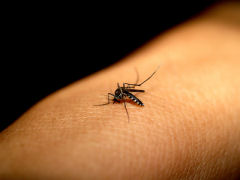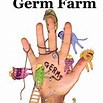
Look BEFORE you LOCK


The happy days of sun also brings along the itchy bites of mosquitoes! Especially this summer, due to the large amount of rain we have experienced. Here is some information about mosquitoes and prevention of their bites that you may find helpful.

Bites from mosquitoes carrying certain viruses or parasites can cause severe illness. Infected mosquitoes can transmit West Nile virus to humans. Other mosquito-borne infections include yellow fever, malaria and some types of brain infection (encephalitis). The prevalence of these diseases depends on the geographic location. Recently, caution has been given about Zika virus and the impact on young women of child bearing age. Some areas of the the USA carry a greater risk of contracting these diseases than others. Speak to your host family to discuss the danger of mosquitos in your local area.
Mosquito Bite Symptoms
After the bite occurs, humans require some sort of mosquito bite treatment in order to ease the symptoms that occur. A mosquito bite usually results in redness and minor local swelling around the mosquito bite site. Itching is also very common and tends to last longer than the swelling, which subsides after a few hours. The itching is caused by a skin reaction to the mosquito’s saliva. These symptoms usually occur soon after the mosquito bite has occurred.
After many bites, some people become rather insensitive to them and their skin barely reacts. However, for others the mosquito bite symptoms become more severe with more bites. In fact, some people are considered allergic to mosquito bites and these individuals would definitely benefit from a mosquito bite treatment.
Unlike allergic reactions to bee stings or wasp stings, where an allergic response can cause immediate death, this same response from a mosquito bite is very rare. Instead, symptoms of an allergic response to a mosquito bite involve more significant swelling of the skin with sometimes very large hives or welts forming, more redness at the bite site, and extreme itching. These symptoms tend to last much longer than in non-allergic individuals, sometimes lasting two or three days. In more severe cases, blistering and bruising may also be the response. Overall, it is a much more uncomfortable and painful situation for the victim and a bite treatment becomes important.
American Mosquito Control Association (AMCA), an international organization of nearly 2,000 public health professionals, formed in 1935. Recommends the following:
Mosquito Bite Prevention
Mosquito bites are annoying for individuals, but often no mosquito bite treatment is used. However, because of the possibility of contracting one of the above mentioned diseases, it is very important to avoid getting bitten as much as possible. Prevention is the best treatment.
In order to reduce the risk of being bitten:
Following these steps will go a long way to preventing bites and the subsequent need for a treatment.
Mosquito Bite Treatment
In order to get relief from the mosquito bite symptoms, a mosquito bite treatment is required. A treatment for mosquito bites involves washing the affected areas with soap and water to ensure no infections develop and to help reduce the itch. Applying soap directly to the bite has been suggested as an itch remover. Use a cold compress on the bite site to help alleviate the itch, swelling, and redness. A bite treatment may also involve some of the procedures listed below.
Not scratching the mosquito bite area is an effective treatment for a mosquito bite. Scratching prolongs the swelling, itch, and discomfort, and can open the skin and cause an infection. If your mosquito bite becomes red and swollen and if the area around the bite feels warm to the touch, the bite may be infected. If this condition persists and does not respond to a standard mosquito bite treatment, then consult a physician
If unusual symptoms develop about five days after being bitten by a mosquito, then a standard mosquito bite treatment is ineffective and a visit to a physician should be a priority. Unusual symptoms can include severe headaches, fever, skin rashes, nausea and vomiting, disorientation, chills, and muscle pains.
http://www.bing.com/news/search?q=helpful+tips+to+prevent+mosquito+bites&qpvt=helpful+tips+to+prevent+mosquito+bites&FORM=NWRFSH

Indulging in Alcohol has been a pastime that dates back to Roman times. In almost every culture, alcohol has played a very important role in its history, good or bad. “We drink for different reasons”, says Caren Osten Gerszberg, the co-founder of the popular lifestyle blog Drinking Diaries. We drink, “to quench thirst, to loosen up, because it tastes good, to enhance a meal, because we’re addicted, as part of a ceremony, to celebrate, to mourn. We drink when we’re happy. We drink when we’re sad.” In my twenties, getting together with my girlfriends meant finishing a few bottles of wine. Now I have two kids in their twenties, a sophomore in college and a recent Graduate, and I know they are doing the same. Rite of passage, way to unwind, liquid courage, social bonding–whatever the reason there is plenty of boozing taking place for girlfriends across the country. However, my girls were taught to drink responsibly because they know the risks of drinking are far greater than the rewards. In the U.S our laws restrict anyone under the age of 21 from drinking alcohol, therefore, to drink underage is a huge risk personally and is against the rules for Au pair In America.
As your counselor I recommend that you withstand drinking underage in the USA. When that time comes that you are legally allowed to drink in the U.S. Or if you are currently of drinking age, here is the advice I have told my own daughters.
Top rules you need to know before the big “Salud”!
Rule No.1:
DO NOT DRINK AND DRIVE. This rule not only concerns your safety but your future as an Au pair. Your Host Family has trusted you with their car to drive their children. Do not ruin that trust or risk damaging their property. I’ll warn you now that If you drive under the influence, you will get arrested. The police in Georgia have cracked down on drinking and driving. For anyone over 21 the legal limit is a BAC ( Blood Alchohol Content ) of .08. This is having only 1 alcoholic beverage. If you are under 21 and if you have had even a sip of alcohol, you can be arrested for underage drinking as well as driving under the influence. Read Georgia’s drinking laws below:
“Like most states, the maximum BAC (blood-alcohol content) permissible by DUI law in Georgia is .08 percent. Over this level, a driver is considered ‘per se intoxicated’ and can be proven guilty Georgia DUI based on this confirmed intoxication level alone.
‘Zero tolerance laws’ are intended to keep drivers under the legal drinking age from indulging in the risk of drinking and driving, and therefore there are stricter penalties and limits for underage drivers. A person under the age of 21 is allowed just .02 percent BAC limit by law before being subjected to DUI penalties.”
Rule No. 2:
PLAN AHEAD. Plan how you will get home before you go out and always make sure your phone is charged.There are many options for getting home such as an Uber, Lyft, a Taxi or a Designated Driver (a friend that agrees not to drink and to make sure everyone is safe while consuming alcohol. )(https://get.uber.com/sign-up/?exp=home_signup_form) .
Rule No. 3:
DRINK IN MODERATION. Know the alcohol content of your drink. The alcohol content or alcohol by volume (ABV) is a standard measurement of how much alcohol is contained in your drink. Interestingly, there is the same amount of alcohol in:
So count each drink the same, whether it’s a shot of Tequila or a glass of Merlot. Also, a good rule of thumb is that your body digests one drink an hour. So be aware of how much you are consuming and know when enough is enough.
Rule No. 4:
BE SAFE. I want you to have a fulfilling Au pair experience, which will include meeting new friends and even becoming a part of a whole new family. I know how hard each of you work during the week, so when you do have free time I hope that you will have fun and enjoy it, but please BE SMART and keep in mind why you’re here. The experiences you make in America will last a lifetime, so you will want to remember every minute of it.
Stay Healthy During This Cold and Flu Season!

Here are some great tips to help keep you healthy and happy while you are here in the USA!
Eat five servings of fruits and vegetables each day.

Drink at least four glasses of water each day.
Have three good laughs each day. This keeps your immune system primed!

Limit computer, TV or phone texting time to less than two hours each day.

Get one hour of physical activity each day.
Get eight of more hours of sleep.
Host families are usually very supportive of an au pair who gets sick. However, if you are staying up late, going out a lot and generally not taking care of yourself, their reaction may be different.
Don’t forget to wash your hands. Say the alphabet song or count to 26. This is how long you must wash to ” wash” away a flu bug.
Wash your hands after being out in public places. 
Have your school age children wash their hands when arriving home from school.
Do you part to keep yourself healthy. This will help to make your au pair stay in the USA the best it can be!
Be Ready! September is National Preparedness Month
Families should be prepared for all types of emergencies; this includes a fire, winter storm, tornado, hurricane, etc. Developing a national disaster plan is extremely important for every family to have. Having an emergency kit for the home and car is a great way to get started.
If you are at work, will your au pair be prepared? Take some time this month to discuss what you would like her to do in the event of an emergency. To find more detailed information provided by FEMA click here! We will be discussing fire safety and prevention at our cluster meeting this month.
Your emergency kit could include:
Supplies for your vehicle or the Au pair car could include:
http://www.cdc.gov/features/beready/
National Severe Weather Preparedness Week is April 22 to April 28. This initiative highlights the importance of planning and practicing how and where to take shelter before severe weather, such as tornadoes and severe thunderstorms, strike. Take a pledge to be prepared!
Use the guide below to discuss tornado safety with your host family.
A tornado is a violently rotating column of air extending between, and in contact with, a cloud and the surface of the earth.
Tornadoes are generally spawned by thunderstorms, though they have been known to occur without the presence of lightning. The stronger tornadoes attain an awe-inspiring intensity, with wind speeds that exceed 200 mph and in extreme cases may approach 300 mph.
The United States has the highest incidence of tornadoes worldwide, with about 1,000 occurring every year. Tornadoes touch down in the Atlanta area each year.
According to Stu Ostro, a Senior Weather Specialist at The Weather Channel, this is due to the unique geography that brings together polar air from Canada, tropical air from the Gulf of Mexico, and dry air from the Southwest to clash in the middle of the country, producing thunderstorms and the tornadoes they spawn.
Tornadoes can come one at a time, or in clusters, and they can vary greatly in length, width, direction of travel, and speed. They can leave a path 50 yards wide or over a mile wide. They may touch down for only a matter of seconds, or remain in contact with the ground for over an hour.
How do I know if a tornado will touch down where I live?
The National Weather Service broadcasts severe weather conditions on radio, TV, or on NOAA Weather Radio. Every host family should have a NOAA weather radio in the home. The radio makes a loud alert sound, letting you know there is an emergency. Some phone apps have this alert also. Some areas of Atlanta have outside warning sirens. This is a very loud alert sound outside. The siren is activated when a tornado has been sited in the specific area.
Ask how you would know when there is an emergency weather event while you are at home with the children???
A tornado WATCH means conditions are right for a tornado to occur. A tornado WARNING means a tornado has been sighted in the posted area or is visible on radar. A location of the sighting is normally given along with its projected movement.
Become familiar with your specific area. What part of Atlanta do you live? What is the county that you live in? What is the closest major highway or street? Become familiar with the television channel that will give you details of where a tornado is touching down. During a tornado warning, listen out for info about your area on television.
A Tornado watch has been issued. What Do I do?
FOR TORNADO WATCHES:
Be alert to changing weather conditions. Look for approaching storms.
Look for the following danger signs:
When a tornado warning has been issued, you may have very little time to prepare. How you respond now is critical.
OBEY ADVISORIES PROMPTLY! ACT QUICKLY!
In A Frame Home
If you are outside:
If you are in a car:
Ideally, you should avoid driving when tornadoes or other kinds of dangerous weather threaten, as a vehicle is a very unsafe place to be. If, however, this is not possible, stay as calm as possible, and assess the situation.
This information was obtained in the Weather Channel web site. For more information go to: http://www.ready.gov/tornadoes